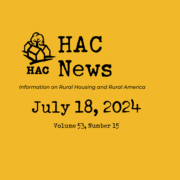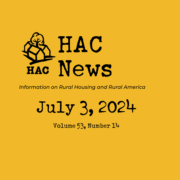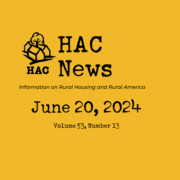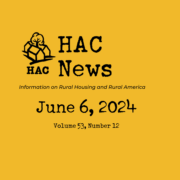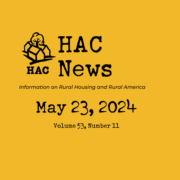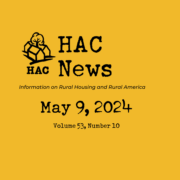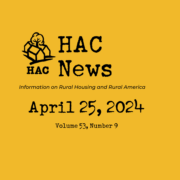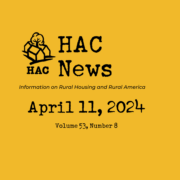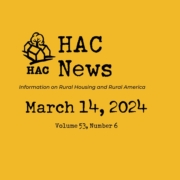HAC News: July 18, 2024
TOP STORIES
House and Senate committees disagree on rural housing funding
Cuts made this year in funding levels for USDA’s Section 502 direct and 523 self-help housing programs would not be fully restored by the bills for next year that have passed the Appropriations Committees in both the House and the Senate. While the Senate’s FY25 bill would hold many of the rural housing programs at their current funding levels, it would set Section 502 direct at $1 billion – higher than the House’s $950 million or the FY24 level of $880 million, but still substantially below the $1.25 million appropriated for FY23. The Section 523 self-help program, which received $32 million in FY23 and $25 million this year, would get $25 million next year under the Senate’s bill and $20 million under the House’s.
The House and Senate both rejected the administration budget’s request to increase funding for the Section 515 and Multifamily Preservation and Revitalization programs. The Senate bill proposes to expand the current decoupling pilot, which allows Section 515 properties to continue receiving Section 521 Rental Assistance after the Section 515 mortgage is paid off. The Senate would allow 5,000 units of decoupled RA rather than the current 1,000.
Details are available on HAC’s website. The next steps will be floor votes in both houses. Final passage of FY25 appropriations is not expected until after the November election, although the new fiscal year begins on October 1.
House committee approves big cut in HOME funding
On July 10 the full House Appropriations Committee approved its FY25 HUD funding bill, which includes a 60% cut in funding for the HOME program. The bill would also block implementation of the Biden administration’s proposed Affirmatively Furthering Fair Housing rule and the recent energy efficiency determination made by HUD and USDA. Details are available on HAC’s website. The Senate has not yet released or scheduled consideration of its HUD bill.
New administration proposal on housing cost and availability
President Biden issued a statement on July 16 asking Congress to pass legislation that would eliminate a tax break for corporate landlords if they raise rent more than 5% per year. The rent cap would apply to landlords owning over 50 units and would last for two years, intended to provide enough time for construction of new units. In addition, several federal agencies are planning or investigating possibilities for creating housing on land they own, and the administration called for state and local governments, as well as other entities, to develop affordable housing on their land.
RuralSTAT
In 2023 the number of new mortgages for rural home purchases declined by 21% from the previous year’s level. In total, there were a reported 559,244 home purchase mortgages, 164,460 mortgage refinancings, and 36,385 home improvement loans made to rural consumers in 2023. Source: Housing Assistance Council tabulations of the Consumer Financial Protection Bureau’s FFIEC Home Mortgage Disclosure Act data.
OPPORTUNITIES
Initiative supports reentry into stable housing
The Council of State Governments and the U.S. Justice Department’s Bureau of Justice Assistance launched the Zero Returns to Homelessness initiative to support reentry into stable housing for justice involved residents. The Zero Returns to Homelessness Cohort will provide state teams with two years of free and extensive technical assistance support intended to generate a concrete expansion in the amount of housing available to people in reentry. Applications are due August 12. Local, regional, and Tribal teams are eligible for a three-session monthly virtual Reducing Housing Barriers to Jail Diversion community of practice. Applications are due July 22. The initiative’s website also offers other resources including a technical assistance guide.
Housing Trust Fund allocations set
HUD has allocated $214 million in FY24 monies from the Housing Trust Fund to states and territories. The total amount, which is based on Fannie Mae and Freddie Mac business in the previous year, is slightly more than the $196 million announced by the Federal Housing Finance Agency in February, but far less than the $354 million available in FY23 and $740 million in FY22.
REGULATIONS AND FEDERAL AGENCIES
FEMA rule to increase resilience against flooding
As repeated flooding occurs more often, the Federal Flood Risk Management Standard (FFRMS) and a new FEMA regulation to implement it are intended to increase resilience. The standard requires stricter standards for including resilience measures when FEMA funds new construction, substantial improvement, or repairs to substantial damage for structures and facilities, including housing. FEMA will pay for the applicable federal cost share to implement the standard. FFRMS also applies to Hazard Mitigation Assistance projects involving structure elevation, dry floodproofing, and mitigation reconstruction.
FEMA requests input on flood insurance Community Rating System
FEMA seeks public comments as it redesigns the Community Rating System under the National Flood Insurance Program. The system and options under consideration are explained in a Federal Register notice and will be covered at virtual public meetings on August 21, 22, and 27. Comments are due September 9.
Rapid Unsheltered Survivor Housing grants explained, comments sought
Rapid Unsheltered Survivor Housing (RUSH) grants, a form of relief under the Emergency Solutions Grants program, will be allocated to state or local governments in areas that are identified as eligible for FEMA Individual Assistance when a major disaster is declared. The funds will be used to address the needs of people experiencing homelessness or at risk of homelessness in declared disaster areas who have needs not otherwise served or fully met by existing federal disaster relief programs. HUD requests comments by September 16.
HUD extends Buy America waiver for Tribal funding recipients
Build America, Buy America requirements are waived through September 30 for Tribes, Tribally Designated Housing Entities, and other Tribal entities that receive HUD funding.
USDA guarantee fees set for some programs
USDA Rural Development announced guarantee fees that will apply during FY25 to the Community Facilities, Water and Waste Disposal, Business and Industry, and Rural Energy for America loan guarantee programs.
HUD moves compliance date for new inspection standards
HUD has extended the compliance date until October 1, 2025 for the National Standards for the Physical Inspection of Real Estate (NSPIRE) final rule for the Housing Choice Voucher, Project Based Voucher, and Section 8 Moderate Rehabilitation programs, and for the HOME program, Housing Trust Fund, Housing Opportunities for Persons With AIDS, Emergency Solution Grants and Continuum of Care programs.
USDA posts income limits
The 2024 income limits are posted online for USDA’s Section 502 direct and guaranteed mortgage programs and the Section 515, 514/516, and 538 multifamily housing programs.
Protections added for tenants in Fannie Mae and Freddie Mac properties
The Federal Housing Finance Agency announced new actions to protect renters in multifamily properties financed by loans acquired by Fannie Mae and Freddie Mac, including requiring 30-day notices before rent increases and 30-day notices on lease expirations, as well as a five-day grace period before imposing late fees on rental payments. The requirements will take effect for new loans signed after February 28, 2025.
PUBLICATIONS AND MEDIA
Fair housing complaints hit record high
The number of fair housing complaints filed nationwide peaked to record numbers for the third year in a row, according to the National Fair Housing Alliance’s 2024 Fair Housing Trends Report. There were 34,150 fair housing complaints received in 2023, compared to 33,007 complaints received in 2022. Discrimination based on disability accounted for the majority (52.61%) of complaints, but there was a noticeably steep increase in the number of harassment complaints, particularly harassment based on color or race. For the first time, NFHA included questions around algorithmic bias and found the level of awareness of the risks and benefits of automated systems in housing ranged from very aware to very little awareness.
Pre-disaster housing planning report issued by FEMA and HUD
The Pre-Disaster Housing Planning Initiative Report was developed through a partnership among FEMA, HUD, and states. It intends to promote collaborative approaches, to bolster state planning for housing recovery before disasters occur, and to build local capacity. In addition to the report, the initiative prepared a Pre-Disaster Housing Planning Checklist and Guide, as well as a Federal Housing and Sheltering Resource Timeline and Compendium.
HAC
HAC is hiring
HAC job listings, each with application instructions, are available on our website.
Need capital for your affordable housing project?
HAC’s loan fund provides low interest rate loans to support single- and multifamily affordable housing projects for low-income rural residents throughout the U.S. and territories. Capital is available for all types of affordable and mixed-income housing projects, including preservation, new development, farmworker, senior and veteran housing. HAC loan funds can be used for pre-development, site acquisition, site development, construction/rehabilitation and permanent financing. Contact HAC’s loan fund staff at hacloanfund@ruralhome.org, 202-842-8600.
Please note: HAC is not able to offer loans to individuals or families. Borrowers must be nonprofit or for-profit organizations or government entities (including Tribes).
Want to reprint a HAC News item?
Please credit the HAC News and provide a link to HAC’s website. Thank you!

